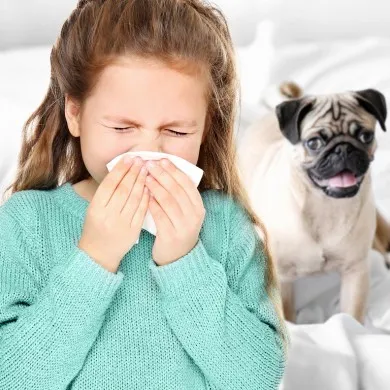We all want the best for our furry friends. But just like humans, dogs can get allergies. While most only cause discomfort, some allergies can lead to respiratory issues if left untreated too long. If you're worried about your canine companion, then you're in luck. Allergy testing for dogs exists! But before you start panicking, you might want to know what to look for, as well as the different tests on offer, and the ways you can alleviate the symptoms yourself. Read on to find all the information you'll need about allergy testing for dogs.
Symptoms of Dog Allergies
If you're worried about your dog, some signs can point towards your dog suffering from allergies. These are:
- Irritated skin or loss of fur in a specific area
- Sneezing or wheezing
- Excessive scratching, or rubbing their body against furniture
- Regularly chewing on the same part of their body
- If they can't stop licking their nose
When your dog is in its first year, they come into contact with lots of allergens. Inquisitive little pups love to go exploring, after all. When they turn 1, their immune systems begin to attack these allergens, which can lead to itching. While most allergies are caused by exposure to the outside world, some can occur from food and things they breathe in. Most dogs that suffer allergic reactions are prone to allergies from multiple sources. These can also change if your dog's environment changes. Moving to a new area or a new country can bring its own set of issues for your dog's allergies.
That's why you should book a vets appointment as soon as your dog starts showing symptoms of allergies. Diagnosing your dog's allergies when they're young has two benefits. Firstly, it makes the treatment more likely to work. And secondly, because of this, you might not have to make so many trips to the vets. Vets aren't cheap, and the costs can add up!
Allergy Tests for Dogs
When the vet has a look at your pawed pal, they'll first check for fleas, mites, and any other skin-based parasites. If they're present, you can discuss treatment. But if the vet believes parasites aren't the cause, or no parasites are found, they may test for specific allergies.
These typically fall into four areas:
- Food allergies
- Inhalant allergies
- Flea allergies
- Contact allergies (grass, plants, dust mites etc.)
Contact allergies are the most commonly found cause of allergic reactions in dogs. These give rise to irritation that leads dogs to scratch the area affected.
There are two tests that the vet will likely perform. The first is a blood sample, referred to as a RAST - or radioallergosorbent test. This is a relatively simple process that doesn't require sedating your pet or shaving their hair. Once taken, the sample can be analysed, and any allergen-specific reactions can be discovered. From there, your vet will likely discuss treatment options to keep your furry friend feeling their best.
The second is called intradermal skin testing, and can only be performed by a veterinarian dermatologist. For this, a large area of your dog's fur must be shaved. As such, your little buddy needs to be sedated. Then, multiple injections are made across the exposed skin. This helps the vet determine which allergens are causing the irritation, and treatment can follow.
How can I aid my dog's recovery?
Once your dog is treated, you can be sure they'll lead a happy, healthy life free of allergies. But these pesky irritants can leave their mark. Thankfully, there are a few ways you can help them back to their best.
Firstly, you could try something to help them with the itchiness. Itch Relief could do the trick. It contains Huang Qin, Ginkgo, Eyebright and Nettle, which are known for their soothing and protecting properties. And best of all, as some dogs can be fussy little things, this all-natural liquid supplement is easy to add to their existing food.
Or, you could try a little Flaxseed Oil. Not only is it full of Omega 3 and Calcium, which helps strengthen bones and joints, but it also contains vitamins that contribute to the natural maintenance of their immune systems. The soft gels are easy to swallow and can be added to their daily dinner.
Just like with people, allergies can also cause your dog's eyes to water. Unlike human tears, dog tears also contain waste that can leave dark reddish stains on their fur. Give them some Tear Stain Remover Soft Chews, which can help tackle the cause of tear stains and leave their coats healthy and fresh.
And that's everything you need to know about allergy testing for dogs. The sooner you get them checked for allergies, the sooner you can both get on with living happy and healthy lives!







